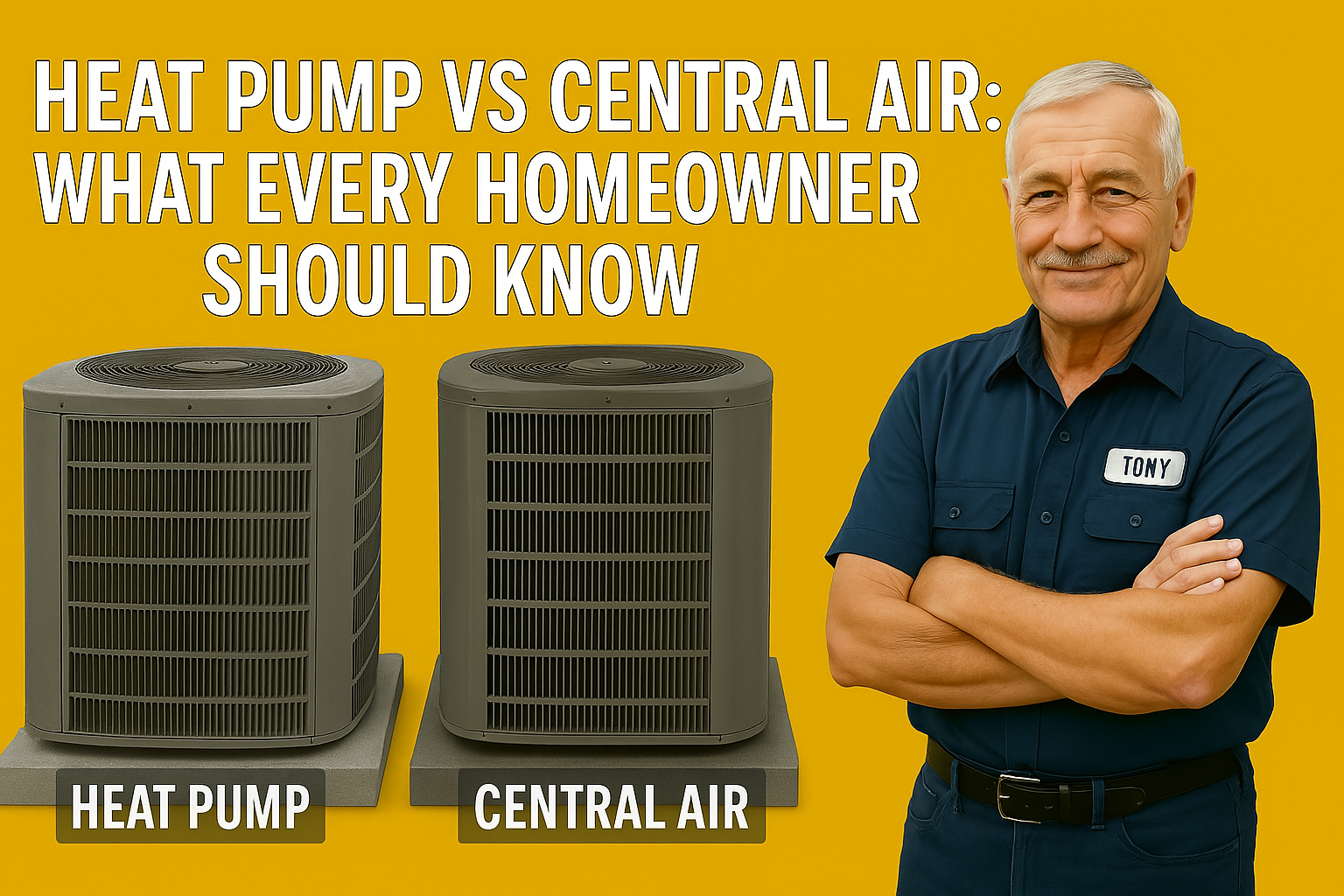👋 Hey Folks! Tony your Trusted Tech here. Today, we’re diving into a question I get a lot: heat pump vs central air — what’s the difference, what costs more, and which is the best fit for your home? Whether you’re replacing an old unit or installing new, understanding the differences between a heat pump and an air conditioner is key to making a smart investment. Let’s break it down.
🧊 What’s the Difference Between a Heat Pump and a Central Air Conditioner?
At the core, both heat pumps and central AC units cool your home by moving heat from inside to outside, but heat pumps come with a bonus—they can reverse that process to heat your home as well. That’s why they’re often called heat pump air conditioner combos. Unlike a traditional central air system that only cools, a heat pump pulls warmth from the outside air even in chilly weather and brings it inside.
If you want the full scoop on how heat pumps work, the U.S. Department of Energy offers a detailed explanation that’s really helpful for homeowners wanting to get technical without getting overwhelmed. Their guide on heat pumps explains the mechanics and efficiency benefits in clear, simple terms.
💰 Heat Pump vs AC Cost — What Should You Expect?
When it comes to upfront costs, heat pumps generally have a higher price tag compared to standard AC units. That’s mainly because they double as heaters and require a bit more sophisticated technology to operate in both modes. However, when you factor in the year-round savings on your utility bills, especially in moderate climates, heat pumps can offer significant cost benefits.
If you're curious about how heat pumps stack up against traditional AC units in terms of energy use and long-term savings, ENERGY STAR provides a clear breakdown of both technologies and what kind of cost benefits you can expect over time — you can check it out on their official heat pump page
⚙️ Central Heat and Air vs Heat Pump — Which One Fits Your HVAC Needs?
One key thing to understand is how these systems integrate with your home’s heating and cooling setup. Central air conditioning typically works with a furnace or boiler to heat your home during colder months, while a heat pump replaces the need for a separate heating system in many cases.
Your choice depends a lot on your climate. In warmer regions, heat pumps make great sense because they handle both cooling and heating efficiently. But if you live in an area with really cold winters, sometimes a central heat and air vs heat pump comparison tips in favor of traditional furnaces paired with AC units.
For a comprehensive guide, check out the insights from the Air Conditioning, Heating, and Refrigeration Institute (AHRI), which highlights the pros and cons of different HVAC combinations including heat pump vs hvac setups.
🏠 Air Handler vs Heat Pump — What’s the Role of Each?
If you’re thinking about installing a system like the Goodman 2.5 Ton 14.5 SEER2 Air Conditioner and Air Handler System, it helps to know the difference between the air handler and the heat pump itself. The air handler circulates conditioned air throughout your home via ducts, working alongside either a furnace or heat pump to distribute warm or cool air evenly.
The Department of Energy has a useful explanation on the difference between AC unit and heat pump and how the air handler plays a vital role in your HVAC system’s efficiency and performance.
🌡️ Climate Suitability
Your local climate plays a significant role in determining the most suitable system:
🌡️ Moderate Climates: Heat pumps are highly efficient in areas with mild winters and summers.
🌡️ Extreme Climates: In regions with very cold winters, central air systems paired with a furnace might be more effective.
For insights on how climate affects system performance, refer to Smock HVAC's guide.
🛠️ Installation and Infrastructure
Both systems require ductwork for air distribution. However:
🔥 Heat Pumps: May necessitate upgrades to existing ductwork and electrical systems to handle heating demands.
❄️ Central Air Systems: Often integrate seamlessly with existing furnaces and ductwork, potentially reducing installation complexities.
Understanding these requirements is crucial. Learn more at HVAC Science's comparison.
🔄 Environmental Impact
Heat pumps tend to be more environmentally friendly because they use electricity to move heat rather than generate it, which helps reduce carbon emissions and cuts back on fossil fuel use. In fact, as explained by Williams Energy, heat pumps are considered a sustainable option for both heating and cooling, especially in homes looking to lower their environmental impact.
For a deeper dive into the environmental benefits, explore Wired's article on heat pumps
💭 Final Thoughts from Tony 💭
If you’re weighing the heat pump vs central air question, it really boils down to your climate, budget, and heating needs. Heat pumps offer versatility and year-round comfort, especially in mild to moderate climates. But if your winters are harsh, pairing a central air conditioner with a furnace might make more sense.
Either way, choosing a system with a solid SEER2 rating—like the 14.5 SEER2 on the Goodman system I trust—means you’re getting energy-efficient performance that can save you money and keep your home comfortable.
Got questions? Feel free to reach out — Tony’s here to help you make the best HVAC decision for your home! 🔧💡
🛠️ Until next time, keep it cool and take care
—Tony 🛠️







